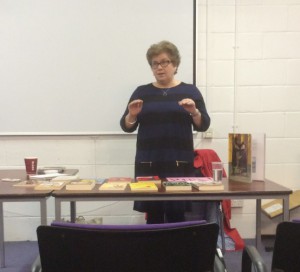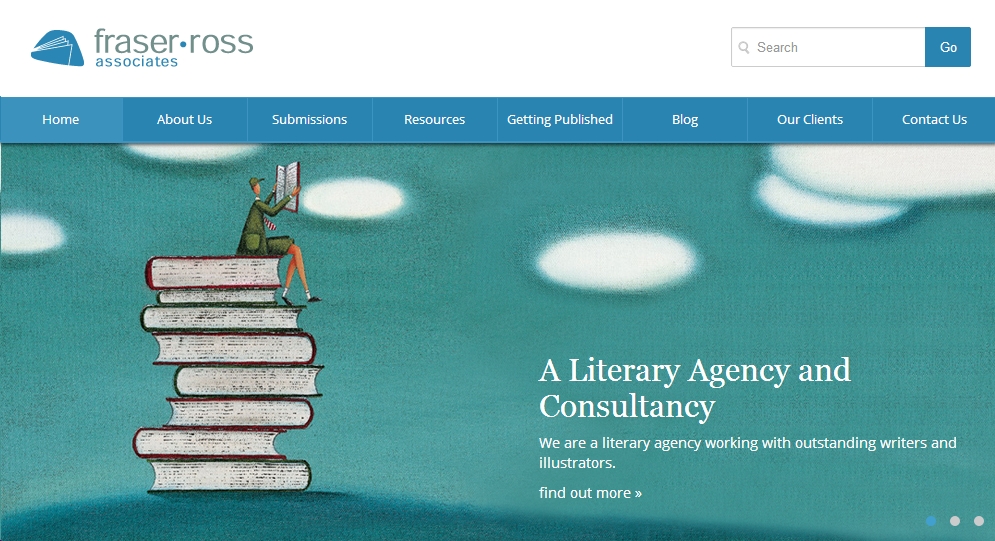Last Thursday, our publishing class had the privilege of spending a few hours with literary agent Kathryn Ross. Alongside Lindsey Fraser, Kathryn runs Fraser Ross Associates Literary Agency and Consultancy (www.fraserross.co.uk), which the pair established in 2002.
![]() Kathryn didn’t take the traditional route to becoming a literary agent. She began as a secondary school English teacher, overseeing the school library, and eventually collaborating with the department head to set up a mobile bookstore in a van. When this venture did well, she left teaching and got a position running the children’s tent at the Edinburgh Book Festival, afterwards moving on to work at the Scottish Book Trust. Kathryn spent ten years here, where she met Lindsey and built up a long list of author and publishing contacts. Finally, with the encouragement of author Vivian French, the pair took the leap of setting up their own literary agency with Vivian as their first client.
Kathryn didn’t take the traditional route to becoming a literary agent. She began as a secondary school English teacher, overseeing the school library, and eventually collaborating with the department head to set up a mobile bookstore in a van. When this venture did well, she left teaching and got a position running the children’s tent at the Edinburgh Book Festival, afterwards moving on to work at the Scottish Book Trust. Kathryn spent ten years here, where she met Lindsey and built up a long list of author and publishing contacts. Finally, with the encouragement of author Vivian French, the pair took the leap of setting up their own literary agency with Vivian as their first client.
Fourteen years down the line, she says her job is hard work, hugely rewarding (emotionally, although not always financially), and that she gets a lot of joy from seeing authors set off, and in helping them grow their careers. Fraser Ross Associates now represents about sixty-five writers and illustrators, most of whom work in children’s fiction (although some write across all age ranges and genres).
 Writing for children is challenging. There’s a lot to accomplish in a short format, including fleshing out the characterisation, problems, and emotions that form a complete story. Children’s books must be equally appealing to parents- these are the buyers, and the ones who will be reading the book over and over. Children’s authors need to be good at summing up and pitching their content, and are now expected to do more marketing and publicity than ever before. An author’s success has increasingly come to depend on things like doing events and getting positive online reviews.
Writing for children is challenging. There’s a lot to accomplish in a short format, including fleshing out the characterisation, problems, and emotions that form a complete story. Children’s books must be equally appealing to parents- these are the buyers, and the ones who will be reading the book over and over. Children’s authors need to be good at summing up and pitching their content, and are now expected to do more marketing and publicity than ever before. An author’s success has increasingly come to depend on things like doing events and getting positive online reviews.
Agents are integral within this process, acting as sounding boards, cheerleaders, and business advisers to an author. This includes ideas development, networking, brand-building, and actively pursuing sub-rights. When taking clients on board, Kathryn and Lindsay look for long-term partnerships, where the content and the personalities both fit. Good communication is essential, as are trust, openness, and honesty, as everyone needs to be able to talk through ideas and problems.
Authors / illustrators and literary agents are often recommended to each other, one of the reasons that networking is vital. Kathryn and Lindsey also seek out new talent, such as by attending end-of-year college art shows. On top of this, they receive unsolicited manuscripts, about 200 per month. Many of these come via email, and Kathryn says she misses the physicality of receiving packages in the post- although she doesn’t miss the occasional extras, like glitter stars, crushed biscuits, melted toffees, etc. Kathryn has gotten some extremely creative submissions over the years, and was able to give us extensive, and often hilarious advice on what not to do, including why penguins and polar bear must never meet.
Each ‘day in the life’ of a literary agent is different, but typical tasks include:
- Reminding publishers to pay invoices
- Checking/negotiating contracts
- Polishing submissions before they’re sent to editors – lots of editing!
- Meeting with publishers, especially in London
- Pushing for better royalties for her clients
- Reading Facebook, Twitter, blogs, and The Bookseller
- Attending launch parties
- Negotiating permissions fees
- Talking authors through outlines, edits, and cover design
- Giving advice to cold callers
- Informing authors of success / rejection
- Discussing deadlines, delays, relationship problems, moving house, etc. with clients
- Paying authors
- Submitting manuscripts
- Sending congratulations cards of all types
- Reading unsolicited submissions
- Attending book fairs, especially Bologna
- Reading, reading, reading, reading, reading, reading, … and emails.
Many thanks to Kathryn for sharing her time with us, and for bringing back the nostalgia of story time for us Masters students!


